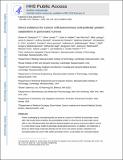Direct evidence for cancer-cell-autonomous extracellular protein catabolism in pancreatic tumors
Author(s)
Kellersberger, Katherine A; Stall, Brian K; Stephanopoulos, Gregory; Bar-Sagi, Dafna; Han, Jongyoon; Rabinowitz, Joshua D; Davidson, Shawn M; Jonas, Oliver H.; Keibler, Mark Andrew; Hou, Han Wei; Luengo, Alba; Mayers, Jared R.; Wyckoff, Jeffrey; Del Rosario, Amanda M; Whitman, Matthew A; Condon, Kendall Janine; Lammers, Alex A; Langer, Robert S; Vander Heiden, Matthew G.; Cima, Michael J.; ... Show more Show less
Downloadnihms855431.pdf (1.716Mb)
PUBLISHER_CC
Publisher with Creative Commons License
Creative Commons Attribution
Terms of use
Metadata
Show full item recordAbstract
Mammalian tissues rely on a variety of nutrients to support their physiological functions. It is known that altered metabolism is involved in the pathogenesis of cancer, but which nutrients support the inappropriate growth of intact malignant tumors is incompletely understood. Amino acids are essential nutrients for many cancer cells that can be obtained through the scavenging and catabolism of extracellular protein via macropinocytosis. In particular, macropinocytosis can be a nutrient source for pancreatic cancer cells, but it is not fully understood how the tumor environment influences metabolic phenotypes and whether macropinocytosis supports the maintenance of amino acid levels within pancreatic tumors. Here we utilize miniaturized plasma exchange to deliver labeled albumin to tissues in live mice, and we demonstrate that breakdown of albumin contributes to the supply of free amino acids in pancreatic tumors. We also deliver albumin directly into tumors using an implantable microdevice, which was adapted and modified from ref. 9. Following implantation, we directly observe protein catabolism and macropinocytosis in situ by pancreatic cancer cells, but not by adjacent, non-cancerous pancreatic tissue. In addition, we find that intratumoral inhibition of macropinocytosis decreases amino acid levels. Taken together, these data suggest that pancreatic cancer cells consume extracellular protein, including albumin, and that this consumption serves as an important source of amino acids for pancreatic cancer cells in vivo.
Date issued
2016-12Department
Massachusetts Institute of Technology. Department of Biology; Massachusetts Institute of Technology. Department of Chemical Engineering; Massachusetts Institute of Technology. Department of Electrical Engineering and Computer Science; Koch Institute for Integrative Cancer Research at MITJournal
Nature Medicine
Publisher
Nature Publishing Group
Citation
Davidson, Shawn M et al. “Direct Evidence for Cancer-Cell-Autonomous Extracellular Protein Catabolism in Pancreatic Tumors.” Nature Medicine 23, 2 (December 2016): 235–241 © 2017 Nature America, Inc., part of Springer Nature
Version: Author's final manuscript
ISSN
1078-8956
1546-170X